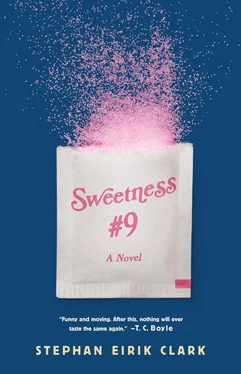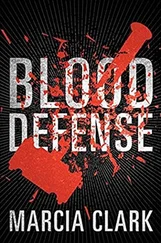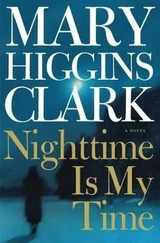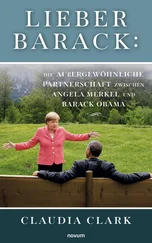“Eliza awoke before I could finish. She called out to me, urging me back to bed. And I would have been a fool to have resisted. Or worse, an old man.” He swallowed the last of his hot dog as if it were medicine. “The taste,” he said, “it has never satisfied. But it is a martyr to love.”
“And so this is why you insist on my losing my hubcaps every time I visit?”
“I purchased a condominium for her last month. In that new mixed-use development downtown.”
“Over the Acme?”
He nodded. “She doesn’t come around here anymore. She thinks she can starve me out. That I’ll come to my senses and join her over there in that well-decorated box. But I won’t do it. If life is a process of losing the things we love, I’ll not go somewhere where it’s easier for me to lose my memories of them. This is my home. You can haul me out of here when I’m dead or no longer sure I’m alive.”
I nodded, letting my eyes drift back to the letter pinned beneath the sugar holder. Ernst noticed and reached for it.
“I’m to be honored at the Society meeting this weekend,” he said. “They’ll have me up there like a man lying in a coffin, listening to his own eulogy.” He handed me the letter. “I’ll make my intentions known then,” he said, while reaching into the sugar holder for something to sweeten his coffee: a packet of Sweetness #9.
“What did I tell you about organizing?” I turned over the porcelain holder, spilling its contents across the table. But this time none of the packets that came tumbling out had a tiny pink bar on one corner of the packaging; there was no sugar, only Sweetness #9.
“We must be out,” Ernst said, when I looked up from this mess.
“What do you mean ‘we’? You said Eliza doesn’t come around anymore.”
He drank his coffee. He looked up at the cuckoo clock.
“Ernst,” I said.
And then he stood and took his cup and saucer to the sink. “I’m sure I can’t explain,” he told me.
As I was driving into the parking lot, I got a call on my cell phone that I answered while fumbling out of the Volvo. “Yes, yes, I hear you,” I said. “Beekley, you say? Oh well, that is distressing.” I hurried in through the rain to the back door, trying to make the client know that the problem would certainly be addressed.
“A top priority,” I said, while marching across the production room floor. “We’ll have a new sample out to you by the end of the week, if not sooner, I promise you that.”
Moments later I was turning in to the flavor development lab, where Koba stood alone at one of the work stations, performing some general compounding.
“Where’s Beekley?”
“Popped out for coffee, I think. Problem?”
I crossed to Beekley’s desk in the far corner of the room and found the notebook in which he scribbled all of his formulas, including those for flavorings in progress. After flipping through a couple of pages, I found what I was looking for, then went to the shelf that ran the length of one wall and collected a dozen or so amber bottles while consulting an open page.
When I had everything I needed, I reached for a glass pipette and began to transfer the appropriate amount of each chemical compound into a test tube. Beekley came in sipping from a cup of Starbucks as I was running the finished mixture through the mass spectrometer.
“Do you ever work?” I said.
“I assure you I’ve been working all morning.” He reached in beneath the back of his lab coat and pulled out a folded copy of Guns ’n’ Ammo from his back pocket. “You think anyone else would read this if I didn’t? What do you know about guns, David? About violence? There’s a whole segment of the population out there that hangs an embroidered copy of the Second Amendment over its headboard at night, and if you don’t know what they like to snack on, or what they’re having for dinner, just who is going to train Koba here? Can you tell me that?”
Koba looked up from his notebook, smiling nervously at our attention. I smoothed down the front of my lab coat and took a step toward Beekley.
“I got a phone call a short while ago. From Terry Butler.”
“Oh?” He set his magazine down.
“Yes, and do you know what he said? That the wild cherry you sent over was a little off-putting.”
This was one of three flavorings that had been requested by a multi-national pharmaceutical company that was readying to launch a new line of liquid anti-psychotics and serotonin reuptake inhibitors for children. Our standard bubble gum and candy apple had already been approved for use, but three iterations of wild cherry, a flavor our test panels suggested cut across ethnic lines, had been rejected, the most recent one more vigorously than any prior to it.
“I had to admit I didn’t sign off on it. ‘Beekley’s my best man,’ I said. ‘I don’t need to second-guess him.’ But after hearing the urgency in his voice—”
Beekley looked at the mass spectrometer. “You second-guessed me?”
“That’s right.” I thrust my nose into the mass spectrometer’s open chamber, then pulled away from it, pinching at one nostril and inhaling deeply. “Now stop me if I’m wrong,” I said, “but the ‘burnt’ and ‘fecal’ top notes I detect suggest you were going for something far wilder than our customary wild cherry.”
Beekley set his coffee down and folded his arms across his chest. “The sample I sent over before this one was perfectly good. They had no reason to reject it.”
“He said he couldn’t be sure, but he thought it tasted a little like — and this is his word— shit. ”
Koba put his pen down and closed his notebook, then started for the door, unbuttoning his lab coat. “I think I’ll just grab an early lunch.”
Beekley leaned back against the counter, shaking his head. “There’s no way he could’ve known that.”
He knew what I was accusing him of. Just as a cartoonist might slip a single pornographic frame into an animated feature, knowing the audience would never realize it, a flavorist might drop an off note into a flavoring just for fun, certain that it would never be detected by even the most discerning human nose. Most people can identify no more than three components in any odor or flavoring; even a talented flavorist might only be able to name another three or four more.
“There’s still time for me to withdraw my sponsorship of you in the Society, you know. And then who would want you, hmm? You’d be no better than a stateless person.”
Beekley sighed and crossed before me to his work station. “I just don’t know if we should be doing this,” he said.
“What?”
“Making it like candy.”
“Children’s medicine? So this is political, is it?”
Now, I understand what this was all about; he had no fewer qualms about the present than I had about the past. But I wasn’t ready for his discomfort. I had left the early seventies behind only a short time before, so it’d be a while still before I could catch up to him and enter the present day.
“What if kids start trading them on the playground?” he said. “‘Give you my bubble gum anti-psychotic for your candy apple anti-depressant.’”
“This is why we have nurses, Beekley. To dispense medicine. Or are you for sick children now? Hardly a platform I can support.”
“All right, all right. You’ll have a new formulation by the end of the day. But when I’m called before Congress to explain how America’s children came to be like fatted calves, standing there ready and compliant for the next Rasputin or Richard Milhous Nixon, it’s your name I’ll say while leaning into the microphone.”
AFTER BETTY HAD FALLEN ASLEEP that night (she rarely made it through Leno’s opening monologue), I tired of lying sleepless in the dark and went downstairs, thinking I’d go out into the garage and tinker with my latest diorama. (“The Birdseye Express,” I was calling it: a scene that showcased Clarence Birdseye’s first insulated railroad car, which provided his frozen food a nationwide system of distribution and assured his company’s success.) As I reached the bottom of the stairs, however, I saw the light on beneath Priscilla’s door. It was a school night, so I turned toward it, then knocked twice and pushed my head inside.
Читать дальше












